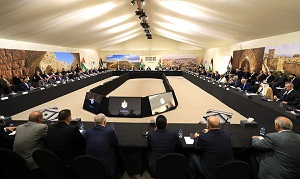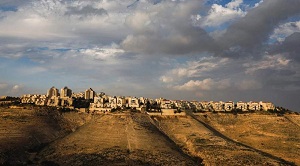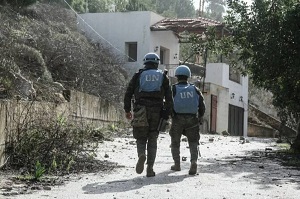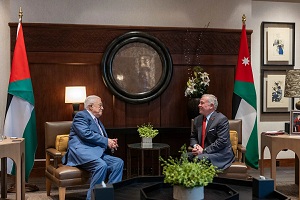Last Sunday, an “historic agreement” was signed between His Majesty King Abdullah and Palestinian Authority President Mahmoud Abbas, aiming at protecting Al Aqsa Mosque and the holy sites in Jerusalem. The text of the agreement details the basis, as well as the goals, of this new and quite sudden move, which hardly adds to what is agreed upon already.
The preamble of the agreement recalls the role of the King Sharif Hussein bin Ali in protecting, and taking care of the holy sites in Jerusalem and in the restoration of the holy sites since 1924. It also reminds that the decision of King Hussein bin Talal to disengage from the West Bank in July 1988 excluded the “Jerusalem holy sites”.
The stated goals of the agreement assign a role to the Jordanian king, in his capacity as custodian, to exert all possible efforts to preserve the Jerusalem holy sites, to assert their respect, “affirm that all Muslims, now and forever, may travel to and from the Islamic holy sites and worship there in confirmation with the freedom of worship” and to also administer the sites.
In addition to existing, well-known and noble objectives of the Jordanian position on Jerusalem, and indeed the entire Palestinian territories occupied since June 1967, a Royal Court statement describing the recent accord affirmed that the agreement “will help Jordan and Palestine exert all efforts to protect Jerusalem from Israeli escalatory Judaisation measures”.
The problem is that Jerusalem is still under Israeli occupation. One part of the city was occupied in 1948, while the remaining part, referred to as East Jerusalem, which was part of the West Bank, was occupied in June 1967. Since then, no Palestinian, joint Palestinian-Jordanian or collective Arab efforts were able to stop Israeli annexation of the entire city and the following Judaisation measures which have indeed reached extremely dangerous proportions.
The Jordan-Israeli peace treaty, signed in October 1994, almost 19 years ago, also recognised a “special role” for Jordan in protecting Muslim holy shrines.
According to Article 9 of the treaty, “Israel agreed to respect Jordan’s special role in protecting Muslim holy shrines in Jerusalem. Israel agreed to give high priority to Jordan’s historic role in these shrines during permanent status negotiations”.
This vaguely worded text neither defined what the term “special role” meant practically nor identified the shrines. Even vaguer was the promise of “high priority” during permanent status negotiations, which could be an entirely meaningless commitment if not a burdensome liability. But that is not unusual when the original intentions are not sound, and I have no doubt that Israel intended to deliberately mislead right from the start.
Despite all the above, Israel has been routinely violating its treaty obligations; contravening international law provisions and norms; abusing Palestinian rights; and desecrating the specific holiness of the very Muslim holy shrines that Jordan is supposed to protect.
In the past few decades, there have been endless Israeli measures threatening not only the sanctity of the religious sites but also the physical existence of Al Aqsa Mosque and the surrounding Haram Al Sharif area as defined in the Jordanian-Palestinian accord. Indeed, the entire historic character of the city has been steadily and systematically compromised.
Under such uneven circumstances, it is difficult to believe that redeployment of responsibilities would have more effective pressure on Israel to revise its aggressive and illegal behaviour, in Jerusalem and elsewhere in the occupied territories, particularly in the aftermath of the historic visit of US President Barack Obama to the region, which endorsed everything the current Israeli ultra-rightwing settler government hoped for.
Jerusalem is indeed a unique city whose holiness or historic significance cannot be questioned. Emphasising this particular factor does not and should not be allowed to detract from the validity of its legal status.
Jerusalem, specifically East Jerusalem, is an Arab city occupied in flagrant violation of international law. The occupation of the city should end in accordance with international law and the many Security Council resolutions that rejected the Israeli annexation of the city right after the 1967 war, and rejected the colonisation of Palestinian lands in and around Jerusalem with the strategic purpose of isolating the future capital of the envisaged state of Palestine from the rest of the West Bank.
The legal case in favour of liberating the city from an ongoing illegal occupation is not, and should not be, based on religious grounds, otherwise we implicitly admit that the other parts of occupied Palestinian and other occupied Arab lands, which are not as holy, are not as important, or that the case in favour of demanding their liberation is not as strong. That would be wrong, misleading and play well in the hands of the occupier.
The Palestinians have every right to demand the liberation of every inch of their occupied land everywhere in the areas designated by UN resolutions as occupied territories, holy or not. And as Jordanians and Palestinians, we should be aware of the political risks of attributing special significance to any occupied land or any occupied city, religious or otherwise, as this instantly renders other areas under occupation of secondary importance.
The preservation, not only of the holy sites, but of every inch in Arab Jerusalem is a Palestinian, a Jordanian and an Arab responsibility. It is really hard to understand why the responsibility for Jerusalem is reduced to the Al Haram Al Sharif area only, and is to be thrown on the shoulders of the Jordanian government alone. What about the responsibility of all the other Muslim and Arab states?
Latest News
-
 Iran warns of 'destructive' influence on diplomacy ahead of Netanyahu's US trip
Iran warns of 'destructive' influence on diplomacy ahead of Netanyahu's US trip
-
 Cabinet approves JD100m package to support public universities
Cabinet approves JD100m package to support public universities
-
 US opposes West Bank annexation after Israel tightens grip
US opposes West Bank annexation after Israel tightens grip
-
 UN force to withdraw most troops from Lebanon by mid 2027
UN force to withdraw most troops from Lebanon by mid 2027
-
 King receives Palestinian president, condemns illegal measures to entrench settlements
King receives Palestinian president, condemns illegal measures to entrench settlements